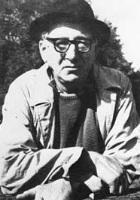
Patrick Kavanagh (Inniskeen, 1904-Dublin, 1967) is one of the leading Irish poets of the twentieth century. Of peasant origin, his poetry develops between oppositions that marked his biographical experience: first, love for the countryside and the rejection of vital restrictions imposed; another, his penchant for mysticism and denunciation of the oppressive Catholic structures of the time.
Attracted by the poetry of T. S. Eliot -the first book that, as an adult, borrowed in a library was the baldía- land and W.H. Auden, whom he considered the best English poet of the twentieth century, his work away from the idyllic and essentialist image of Ireland that the authors of the symbolist movement had created, as W. B. Yeats. That rejection led the way for a poetry made on the hardness of the rural, which transformed the literary and political genealogy of the country; there would leave later poets like Seamus Heaney, which has written excellent pages on Kavanagh-, Derek Mahon and Paul Muldoon.
His work, not extensive, includes two autobiographical novels -The Green Fool (1938), Tarry Flynn (1948) - and five books of poems, among which the poem-book The Great Hunger (1942), considered one of central works of modern Irish poetry.




